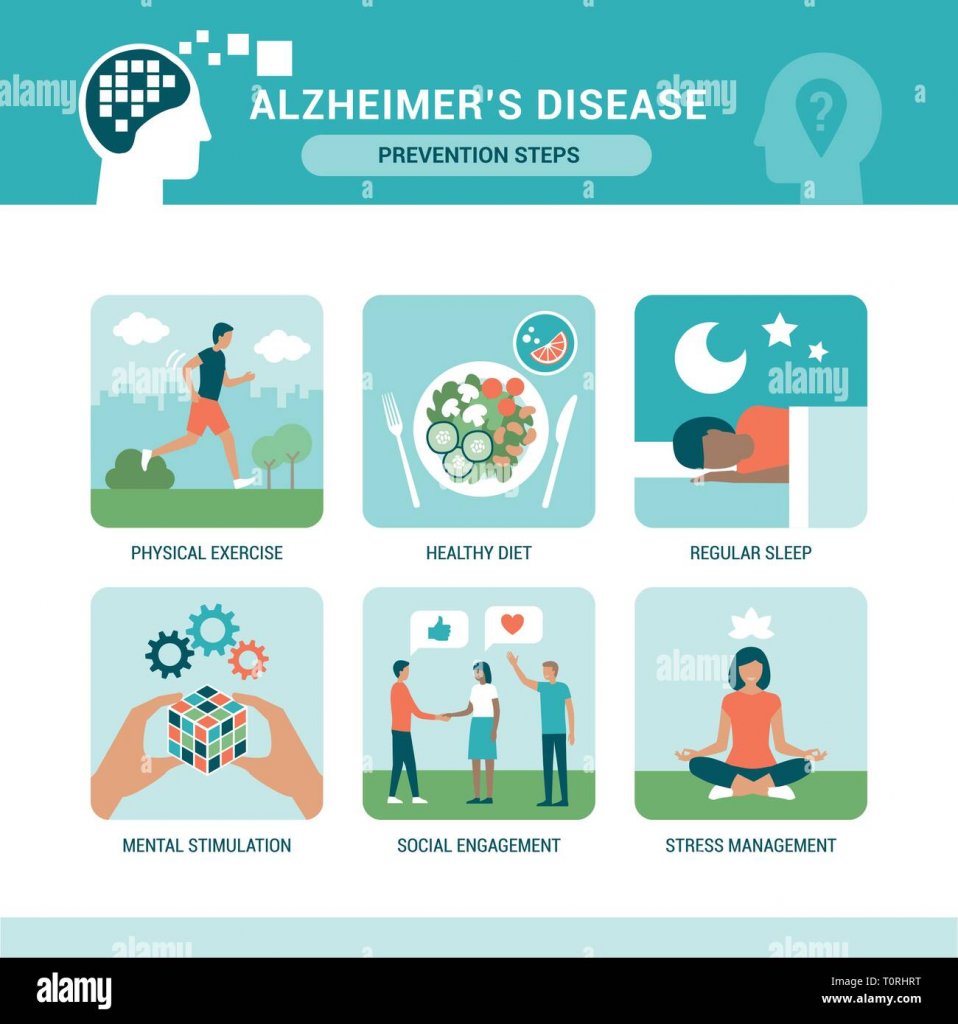
(Source: mdlinx.com)
What is Alzheimer’s Disease?
Alzheimer’s disease? It is a prevalent issue that affects the elderly and is thought to impact at least 5% of Malaysia’s population aged 65 and above. The number of patients with this disease is expected to grow with the increase in older adults, which has important implications for the country’s resources. The National Health and Mobility Survey shows that 8.5 per cent of Malaysia’s senior citizens may have dementia, with Alzheimer’s disease accounting for 60 to 70 per cent of dementia cases.
Alzheimer’s is a degenerative brain condition brought on by intricate brain changes after cell injury. It causes dementia symptoms, which progressively get worse over time. The term “dementia” refers to symptoms that may include memory loss, difficulty thinking, a steady decline in behavioural and social skills, and a person’s capacity to operate independently. Since Alzheimer’s primarily affects the hippocampus, a brain region essential to daily memory, these early signs of the disease are difficulties remembering recent events and learning new information. In the early stages of the disease, memory of current life experiences is quickly forgotten. The symptoms of Alzheimer’s disease, which include confusion, disorientation, and behavioural changes, worsen as the disease progresses—speaking, swallowing, and walking ultimately become challenging.
Who will get Alzheimer’s Disease?
People over 65 are the primary victims of getting Alzheimer’s disease. According to ADFM project director CS Gan, in Malaysia, there will be 261,000 persons living with dementia in total by 2021. Over the next few years, an enormous aged population is in danger of developing Alzheimer’s disease and dementia due to Malaysia’s ageing population. According to a Statista estimate, by the year 2050, there will be 590,000 persons living with dementia in Malaysia. Alzheimer’s Disease Foundation Malaysia said that most people who get Alzheimer’s disease do so after age 65, but it can also affect younger people. One in twenty individuals with the disease is under 65. People as young as 40 can develop this type of Alzheimer’s disease, also often known as early- or young-onset Alzheimer’s.
Research indicates that several illnesses and lifestyle choices linked to cardiovascular disease can raise the risk of Alzheimer’s disease. Smokers, obese individuals, diabetics, persons with high blood pressure, and people with high cholesterol that damage the blood vessels will increase the risk of stroke and heart attack, contributing to developing Alzheimer’s disease in later life.
How can you help Alzheimer's patients?
Patients with Alzheimer’s are like bodies without souls; they aren’t even able to recognise their loved ones as their condition gets worse. It reminds me of the grandmother of Koe Yeet (a Malaysian Actress).
@koeyeet Grandma with Alzheimer’s thinks she is 10 🙃 Don’t worry, we will hold your hand through it all. Let’s find beauty in hard times.#alzheimersawareness
♬ Married Life (Arr. for Piano) - Amy Mary Collins
You can see what an Alzheimer’s patient genuinely looks like in this video. Her grandmother has Alzheimer’s, can’t recall her family members, and acts like a child who thinks she is only ten years old. Giving someone with Alzheimer’s disease care can be a taxing and emotional journey. When a loved one who spent so many years with you doesn’t remember you, you must be sad. Meanwhile, the forget Alzheimer’s patients might also be a good thing; at least they are happy and won’t feel like a burden.

(Source: malaysia.news.yahoo.com)
So, as their family members, how can you help them?
It is hazardous to leave Alzheimer’s patients home alone because they frequently spend their time sleeping or sitting, which could worsen their condition. Some of them may also leave the house, and I believe that we have seen numerous news reports about older adults who were unable to find their way home because they had forgotten where their house was and how to get there. Many of us worked or studied on weekdays, so we could not adequately care for our loved ones. However, Alzheimer’s Disease Foundation Malaysia (ADFM) said that the number of people with dementia whose end-stage condition makes them dependent on 24-hour care is expected to be between 204,000 and 264,000. (8.5 per cent to 11 per cent). Hence, we can bring them to an Alzheimer’s centre, such as a daycare centre established by the Alzheimer’s Disease Foundation Malaysia in Petaling Jaya. There are a large number of trained nurses who will take care of them, and you won’t have to worry about them getting lost. Also, your loved one can interact socially with other older people with Alzheimer’s. Additionally, to keep them occupied, they will participate in activities such as singing, jogging, and colouring in the centre. These activities can slow the patient’s progress and ensure that they have fun, even though it is impossible to change the patient’s condition.
Next, you can play board games with your loved one to help challenge their brain. Great brain activity is playing board games. Board games help to stimulate the parts of their brains involved in memory development. Simple board games like word puzzles, dominoes, playing cards, dice, and jigsaw puzzles can be modified to serve as Alzheimer’s patients’ leisure activities.
Last but not least, to prevent them from going missing, you must write down all the essential information, including their name, address, and emergency contact, on a piece of paper, fold it into a card and hang it on their chest. So when they are missing, others can assist you by calling or sending them back.
No matter how much effort we put in to help them, they can’t recover from this disease completely. People with Alzheimer’s need to be cared for and kept company, but this is an onerous duty that takes a lot of patience and effort. Even so, it’s all worthwhile when we see their genuine smiles.
What can the elderly do to prevent Alzheimer’s?

(Source:alamy.com)
Before having any symptoms of Alzheimer’s disease, what can you do when you become older to avoid developing Alzheimer’s? There is no known technique to prevent Alzheimer’s disease altogether because its specific source is still a mystery. However, having a healthy lifestyle can help you to lower your risk.
Alzheimer’s disease risk is higher in people who have cardiovascular disease. Improving your cardiovascular health may lower the likelihood of developing these illnesses as you age. Hence, you should:
- Stop smoking
- Limit alcohol consumption
- Consume fruits and vegetables daily to maintain a healthy and balanced diet.
- Engage in moderate-intensity aerobic action to build your muscles and enhance your cognition, which is essential as you age—for example, cycling, quick walking, or Tai Chi.
- Monitor daily blood pressure
Additionally, you should maintain a healthy level of mental and social activity throughout your life, especially for those in retirement. This is because retirees may have nothing to do after they stop working and stay home all day, which could eventually lead to health issues. For now, you can lower your chance of developing Alzheimer’s disease and other forms of dementia by:
- Volunteering in community service
- Trying new activities or hobbies
- Pursuing a social life that is active through socialising with neighbours and friends
References:
1. https://www.nst.com.my/news/online-special/2022/06/802683/dementia-cases-set-rise-312-cent-2050-malaysia-prepared%C2%A0
2. https://www.nhs.uk/conditions/alzheimers-disease/
3. https://adfm.org.my/alzheimers-disease/
4. https://www.nia.nih.gov/health/what-alzheimers-disease#:~:text=Alzheimer’s%20disease%20is%20a%20brain,appear%20in%20their%20mid%2D60s
5. https://www.health.harvard.edu/mind-and-mood/alzheimers-in-the-family
6. https://malaysia.news.yahoo.com/malaysian-organisation-trying-help-those-070455485.html?guccounter=1

Gut Health for Yoginis: Enhancing Your Practice with Fiber and Ancestral Nutritions Fibre Clenz
Share on facebook Facebook Share on twitter Twitter Share on linkedin LinkedIn Share on facebook Facebook Share on pinterest Pinterest Share on telegram Telegram Share
A Pillar of Strength in Golden Years: 10 Paths on How Regular Screenings Uphold Your Health
In the evocative voyage of life, the golden years emerge as a time to relish the fruits of decades of labor, to bask in the
Unlock the Secret to Sweet Dreams: 10 Ways of Enhancing Sleep Quality as You Age
Share on facebook Facebook Share on twitter Twitter Share on linkedin LinkedIn Share on pinterest Pinterest Share on telegram Telegram Share on whatsapp WhatsApp Share
Building Bridges, Not Walls: 10 Methods of Mastering the Art of Cultivating Social Connections in the Golden Years
Share on facebook Facebook Share on twitter Twitter Share on linkedin LinkedIn Share on telegram Telegram Share on whatsapp WhatsApp Share on email Email Share
Navigating the Golden Years: 10 Ways to Achieve Emotional Wellness and Conquering Loneliness
Share on facebook Facebook Share on twitter Twitter Share on linkedin LinkedIn Share on pinterest Pinterest Share on telegram Telegram Share on whatsapp WhatsApp Share
Stay Brainy in Your Golden Years: 10 Fun Activities to Keep Your Mind Sharp and Engaged!
Hello, brain buffs! Aging might be inevitable, but letting our minds turn to mush? No way, José! Time to boot up those brain cells and